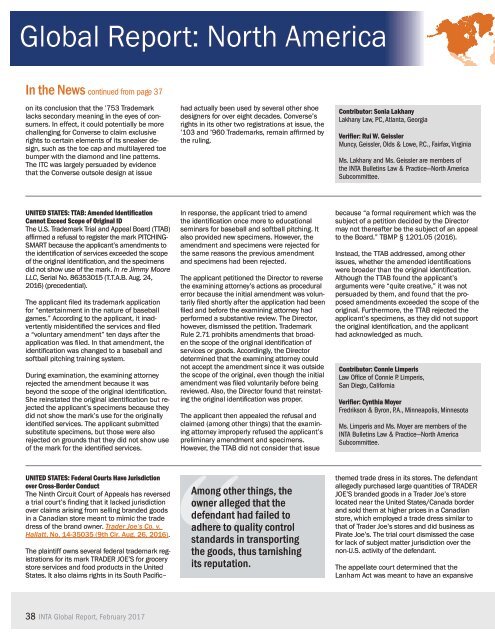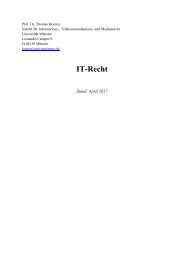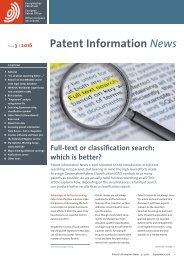GlobalReport
QqMg309yB9H
QqMg309yB9H
You also want an ePaper? Increase the reach of your titles
YUMPU automatically turns print PDFs into web optimized ePapers that Google loves.
Global Report: North America<br />
In the News continued from page 37<br />
on its conclusion that the ’753 Trademark<br />
lacks secondary meaning in the eyes of consumers.<br />
In effect, it could potentially be more<br />
challenging for Converse to claim exclusive<br />
rights to certain elements of its sneaker design,<br />
such as the toe cap and multilayered toe<br />
bumper with the diamond and line patterns.<br />
The ITC was largely persuaded by evidence<br />
that the Converse outsole design at issue<br />
had actually been used by several other shoe<br />
designers for over eight decades. Converse’s<br />
rights in its other two registrations at issue, the<br />
’103 and ’960 Trademarks, remain affirmed by<br />
the ruling.<br />
Contributor: Sonia Lakhany<br />
Lakhany Law, PC, Atlanta, Georgia<br />
Verifier: Rui W. Geissler<br />
Muncy, Geissler, Olds & Lowe, P.C., Fairfax, Virginia<br />
Ms. Lakhany and Ms. Geissler are members of<br />
the INTA Bulletins Law & Practice—North America<br />
Subcommittee.<br />
UNITED STATES: TTAB: Amended Identification<br />
Cannot Exceed Scope of Original ID<br />
The U.S. Trademark Trial and Appeal Board (TTAB)<br />
affirmed a refusal to register the mark PITCHING-<br />
SMART because the applicant’s amendments to<br />
the identification of services exceeded the scope<br />
of the original identification, and the specimens<br />
did not show use of the mark. In re Jimmy Moore<br />
LLC, Serial No. 86353015 (T.T.A.B. Aug. 24,<br />
2016) (precedential).<br />
The applicant filed its trademark application<br />
for “entertainment in the nature of baseball<br />
games.” According to the applicant, it inadvertently<br />
misidentified the services and filed<br />
a “voluntary amendment” ten days after the<br />
application was filed. In that amendment, the<br />
identification was changed to a baseball and<br />
softball pitching training system.<br />
During examination, the examining attorney<br />
rejected the amendment because it was<br />
beyond the scope of the original identification.<br />
She reinstated the original identification but rejected<br />
the applicant’s specimens because they<br />
did not show the mark’s use for the originally<br />
identified services. The applicant submitted<br />
substitute specimens, but those were also<br />
rejected on grounds that they did not show use<br />
of the mark for the identified services.<br />
In response, the applicant tried to amend<br />
the identification once more to educational<br />
seminars for baseball and softball pitching. It<br />
also provided new specimens. However, the<br />
amendment and specimens were rejected for<br />
the same reasons the previous amendment<br />
and specimens had been rejected.<br />
The applicant petitioned the Director to reverse<br />
the examining attorney’s actions as procedural<br />
error because the initial amendment was voluntarily<br />
filed shortly after the application had been<br />
filed and before the examining attorney had<br />
performed a substantive review. The Director,<br />
however, dismissed the petition. Trademark<br />
Rule 2.71 prohibits amendments that broaden<br />
the scope of the original identification of<br />
services or goods. Accordingly, the Director<br />
determined that the examining attorney could<br />
not accept the amendment since it was outside<br />
the scope of the original, even though the initial<br />
amendment was filed voluntarily before being<br />
reviewed. Also, the Director found that reinstating<br />
the original identification was proper.<br />
The applicant then appealed the refusal and<br />
claimed (among other things) that the examining<br />
attorney improperly refused the applicant’s<br />
preliminary amendment and specimens.<br />
However, the TTAB did not consider that issue<br />
because “a formal requirement which was the<br />
subject of a petition decided by the Director<br />
may not thereafter be the subject of an appeal<br />
to the Board.” TBMP § 1201.05 (2016).<br />
Instead, the TTAB addressed, among other<br />
issues, whether the amended identifications<br />
were broader than the original identification.<br />
Although the TTAB found the applicant’s<br />
arguments were “quite creative,” it was not<br />
persuaded by them, and found that the proposed<br />
amendments exceeded the scope of the<br />
original. Furthermore, the TTAB rejected the<br />
applicant’s specimens, as they did not support<br />
the original identification, and the applicant<br />
had acknowledged as much.<br />
Contributor: Connie Limperis<br />
Law Office of Connie P. Limperis,<br />
San Diego, California<br />
Verifier: Cynthia Moyer<br />
Fredrikson & Byron, P.A., Minneapolis, Minnesota<br />
Ms. Limperis and Ms. Moyer are members of the<br />
INTA Bulletins Law & Practice—North America<br />
Subcommittee.<br />
UNITED STATES: Federal Courts Have Jurisdiction<br />
over Cross-Border Conduct<br />
The Ninth Circuit Court of Appeals has reversed<br />
a trial court’s finding that it lacked jurisdiction<br />
over claims arising from selling branded goods<br />
in a Canadian store meant to mimic the trade<br />
dress of the brand owner. Trader Joe’s Co. v.<br />
Hallatt, No. 14-35035 (9th Cir. Aug. 26, 2016).<br />
The plaintiff owns several federal trademark registrations<br />
for its mark TRADER JOE’S for grocery<br />
store services and food products in the United<br />
States. It also claims rights in its South Pacific–<br />
Among other things, the<br />
owner alleged that the<br />
defendant had failed to<br />
adhere to quality control<br />
standards in transporting<br />
the goods, thus tarnishing<br />
its reputation.<br />
themed trade dress in its stores. The defendant<br />
allegedly purchased large quantities of TRADER<br />
JOE’S branded goods in a Trader Joe’s store<br />
located near the United States/Canada border<br />
and sold them at higher prices in a Canadian<br />
store, which employed a trade dress similar to<br />
that of Trader Joe’s stores and did business as<br />
Pirate Joe’s. The trial court dismissed the case<br />
for lack of subject matter jurisdiction over the<br />
non-U.S. activity of the defendant.<br />
The appellate court determined that the<br />
Lanham Act was meant to have an expansive<br />
38 INTA Global Report, February 2017





